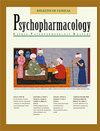Plasma Indolamine 2,3 dioxygenase and serum neopterin levels in patients with first episode major depressive disorder and recurrent major depressive disorder
Q Medicine
Klinik Psikofarmakoloji Bulteni-bulletin of Clinical Psychopharmacology
Pub Date : 2017-01-01
DOI:10.5455/bcp.20151204115629
引用次数: 0
Abstract
Objective: The aims of this study were to determine whether the plasma Indolamine 2,3 dioxygenase and neopterin levels in patients with major depression differ from a healthy control group and to investigate the relationship between previous major depression episodes and plasma indolamine 2,3 dioxygenase and serum neopterin levels. Methods: Thirty eight first episode major depression patients, sixty four recurrent major depression patients and forty one healthy control participant included the study. Plasma indolamine 2,3 dioxygenase and serum neopterin levels compared in these three groups. Results: Plasma indolamine 2,3 dioxygenase and serum neopterin levels in recurrent major depression group were statistically higher than first episode major depression and healthy control group. There was a positive correlation between plasma IDO levels and number of depressive episodes in major depression group (rho=0.36, p<0.001). Conclusion: According to these findings previous major depression episodes can promote response of the immune system associated with proinflamatuar cytokine activity. This sensitizing effect of previous depressive episodes may increase the recurrence risk of depression.首发和复发性重度抑郁症患者血浆吲哚胺2,3双加氧酶及血清新蝶呤水平
目的:探讨重度抑郁症患者血浆吲哚拉明2,3双加氧酶和新蝶呤水平与健康对照组的差异,探讨重度抑郁症患者既往发作与血浆吲哚拉明2,3双加氧酶和血清新蝶呤水平的关系。方法:对38例首发重度抑郁症患者、64例复发性重度抑郁症患者和41例健康对照进行研究。三组血浆吲哚胺2,3双加氧酶及血清新蝶呤水平比较。结果:复发性重度抑郁组血浆吲哚胺2,3双加氧酶及血清新蝶呤水平均高于首发重度抑郁组及健康对照组。重度抑郁组患者血浆IDO水平与抑郁发作次数呈正相关(rho=0.36, p<0.001)。结论:以往的重度抑郁发作可促进免疫系统的反应,并与促炎细胞因子活性相关。以往抑郁发作的这种致敏效应可能会增加抑郁症复发的风险。
本文章由计算机程序翻译,如有差异,请以英文原文为准。
求助全文
约1分钟内获得全文
求助全文
来源期刊
CiteScore
0.34
自引率
0.00%
发文量
0
审稿时长
6-12 weeks

 求助内容:
求助内容: 应助结果提醒方式:
应助结果提醒方式:


